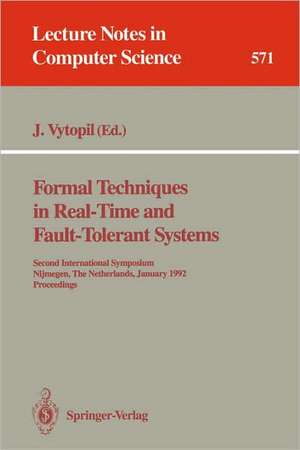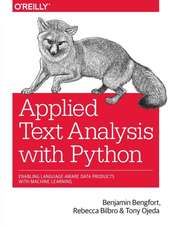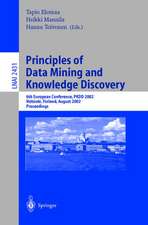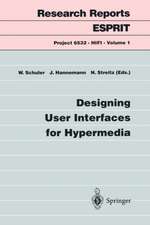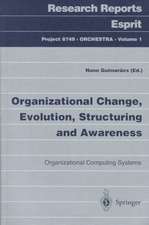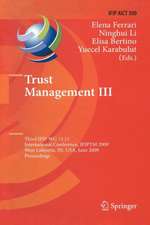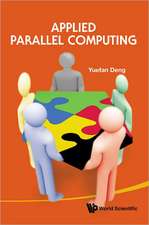Formal Techniques in Real-Time and Fault-Tolerant Systems: Second International Symposium, Nijmegen, The Netherlands, January 8-10, 1992. Proceedings: Lecture Notes in Computer Science, cartea 571
Editat de Jan Vytopilen Limba Engleză Paperback – 11 dec 1991
| Toate formatele și edițiile | Preț | Express |
|---|---|---|
| Paperback (2) | 662.48 lei 43-57 zile | |
| Springer Berlin, Heidelberg – 11 dec 1991 | 662.48 lei 43-57 zile | |
| Springer Us – 27 sep 2012 | 983.71 lei 43-57 zile | |
| Hardback (1) | 989.96 lei 43-57 zile | |
| Springer Us – 30 apr 1993 | 989.96 lei 43-57 zile |
Din seria Lecture Notes in Computer Science
- 20%
 Preț: 1061.55 lei
Preț: 1061.55 lei - 20%
 Preț: 307.71 lei
Preț: 307.71 lei - 20%
 Preț: 438.69 lei
Preț: 438.69 lei - 20%
 Preț: 645.28 lei
Preț: 645.28 lei -
 Preț: 410.88 lei
Preț: 410.88 lei - 15%
 Preț: 580.46 lei
Preț: 580.46 lei - 17%
 Preț: 427.22 lei
Preț: 427.22 lei - 20%
 Preț: 596.46 lei
Preț: 596.46 lei -
 Preț: 381.21 lei
Preț: 381.21 lei - 20%
 Preț: 353.50 lei
Preț: 353.50 lei - 20%
 Preț: 1414.79 lei
Preț: 1414.79 lei - 20%
 Preț: 309.90 lei
Preț: 309.90 lei - 20%
 Preț: 583.40 lei
Preț: 583.40 lei - 20%
 Preț: 1075.26 lei
Preț: 1075.26 lei - 20%
 Preț: 310.26 lei
Preț: 310.26 lei - 20%
 Preț: 655.02 lei
Preț: 655.02 lei - 20%
 Preț: 580.93 lei
Preț: 580.93 lei - 20%
 Preț: 340.32 lei
Preț: 340.32 lei - 15%
 Preț: 438.59 lei
Preț: 438.59 lei - 20%
 Preț: 591.51 lei
Preț: 591.51 lei - 20%
 Preț: 649.49 lei
Preț: 649.49 lei - 20%
 Preț: 337.00 lei
Preț: 337.00 lei -
 Preț: 449.57 lei
Preț: 449.57 lei - 20%
 Preț: 607.39 lei
Preț: 607.39 lei - 20%
 Preț: 1024.44 lei
Preț: 1024.44 lei - 20%
 Preț: 579.30 lei
Preț: 579.30 lei - 20%
 Preț: 763.23 lei
Preț: 763.23 lei - 20%
 Preț: 453.32 lei
Preț: 453.32 lei - 20%
 Preț: 575.48 lei
Preț: 575.48 lei - 20%
 Preț: 585.88 lei
Preț: 585.88 lei - 20%
 Preț: 825.93 lei
Preț: 825.93 lei - 20%
 Preț: 763.23 lei
Preț: 763.23 lei - 17%
 Preț: 360.19 lei
Preț: 360.19 lei - 20%
 Preț: 1183.14 lei
Preț: 1183.14 lei - 20%
 Preț: 340.32 lei
Preț: 340.32 lei - 20%
 Preț: 504.57 lei
Preț: 504.57 lei - 20%
 Preț: 369.12 lei
Preț: 369.12 lei - 20%
 Preț: 583.40 lei
Preț: 583.40 lei - 20%
 Preț: 343.62 lei
Preț: 343.62 lei - 20%
 Preț: 350.21 lei
Preț: 350.21 lei - 20%
 Preț: 764.89 lei
Preț: 764.89 lei - 20%
 Preț: 583.40 lei
Preț: 583.40 lei -
 Preț: 389.48 lei
Preț: 389.48 lei - 20%
 Preț: 341.95 lei
Preț: 341.95 lei - 20%
 Preț: 238.01 lei
Preț: 238.01 lei - 20%
 Preț: 538.29 lei
Preț: 538.29 lei
Preț: 662.48 lei
Preț vechi: 828.09 lei
-20% Nou
Puncte Express: 994
Preț estimativ în valută:
126.77€ • 132.69$ • 105.51£
126.77€ • 132.69$ • 105.51£
Carte tipărită la comandă
Livrare economică 31 martie-14 aprilie
Preluare comenzi: 021 569.72.76
Specificații
ISBN-13: 9783540550921
ISBN-10: 3540550925
Pagini: 640
Ilustrații: XII, 628 p.
Dimensiuni: 155 x 235 x 34 mm
Greutate: 0.89 kg
Ediția:1991
Editura: Springer Berlin, Heidelberg
Colecția Springer
Seria Lecture Notes in Computer Science
Locul publicării:Berlin, Heidelberg, Germany
ISBN-10: 3540550925
Pagini: 640
Ilustrații: XII, 628 p.
Dimensiuni: 155 x 235 x 34 mm
Greutate: 0.89 kg
Ediția:1991
Editura: Springer Berlin, Heidelberg
Colecția Springer
Seria Lecture Notes in Computer Science
Locul publicării:Berlin, Heidelberg, Germany
Public țintă
ResearchCuprins
ISL: An interval logic for the specification of real-time programs.- Duration specifications for shared processors.- A compositional semantics for fault-tolerant real-time systems.- Modelling real-time behavior with an interval time calculus.- Multicycles and RTL logic satisfiability.- Voluntary preemption: A tool in the design of hard real-time systems.- Observing task preemption in Ada 9X.- Real-time scheduling by queue automata.- Broadcast communication for real-time processes.- Analysis of timeliness requirements in safety-critical systems.- Verification of a reliable net protocol.- Mechanical verification of a generalized protocol for Byzantine fault tolerant clock synchronization.- Formal specification and verification of a fault-masking and transient-recovery model for digital flight-control systems.- On fault-tolerant symbolic computations.- Temporal logic applied to reliability modelling of fault-tolerant systems.- Specifying asynchronous transfer of control.- Protocol design by layered decomposition.- Scheduling in Real-Time Models.- A temporal approach to requirements specification of real-time systems.- RLucid, a general real-time dataflow language.- A mechanized theory for the verification of real-time program code using higher order logic.- Specification and verification of real-time behaviour using Z and RTL.- TAM: A formal framework for the development of distributed real-time systems.- An attempt to confront asynchronous reality to synchronous modelization in the ESTEREL language.- The real-time behaviour of asynchronously communicating processes.- Asynchronous communication in real space process algebra.- Translating timed process algebra into prioritized process algebra.- Operational semantics for timed observations.- Real-timed concurrent refineablebehaviours.- Stepwise development of model-oriented real-time specifications from action/event models.- Formal specification of fault tolerant real time systems using minimal 3-sorted modal logic.- Timed and Hybrid Statecharts and their textual representation.
